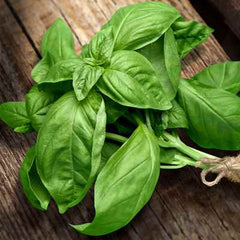Sweet Basil
Nature’s Bright, Healing Herb for Skin and Scalp
Basil, Ocimum basilicum, also known as Sweet Basil or Common Basil, has been treasured for thousands of years across India, the Middle East, the Mediterranean, and beyond. Its name comes from the Greek basileus, meaning “king,” reflecting the high regard ancient cultures held for this aromatic herb.
Historically, basil played roles in spiritual rituals, traditional remedies, and beauty practices—from Egyptian offerings of basil and myrrh to Indian court oaths sworn on basil leaves. During Elizabethan times, sweet basil was used as a snuff to ease colds and headaches and to clear the mind.
Today, basil remains a valued botanical in natural skincare and hair care thanks to its rich profile of vitamins, minerals, antioxidants, and powerful plant compounds such as linalool and eugenol.
Key Traditional & Historical Uses
- Used in Ayurvedic and Mediterranean traditions for calming nausea and easing digestive discomfort.
- Applied topically for centuries to soothe skin irritations, insect bites, and mild wounds.
- Infusions of basil leaves and flowers were used to refresh dull complexions and tone the skin.
- In parts of Asia, soil from basil gardens was used as a mineral-rich mud bath to relieve skin ailments.
Skin Care Benefits
- Antibacterial & antifungal: Helps combat acne-causing bacteria and reduce breakouts.
- Anti-inflammatory: Calms redness, itching, insect bites, and irritated or inflamed skin.
- Rich in antioxidants: Helps protect skin from environmental stressors and oxidative damage.
- Brightening & toning: Supports improved circulation, contributing to a healthy, radiant glow.
- Oil-balancing: Helps regulate sebum production—ideal for oily and acne-prone skin.
- Hydrating support: Basil-infused oils help moisturize while keeping the skin balanced, not greasy.
Hair & Scalp Benefits
- Stimulates circulation: Encourages nutrient-rich blood flow to hair follicles, promoting healthy growth.
- Strengthens the hair shaft: Magnesium and antioxidants help reduce breakage and hair fall.
- Scalp soothing: Its anti-inflammatory and antimicrobial properties ease itchiness and help manage dandruff.
- Balances scalp oils: Helps maintain a clean, healthy scalp environment.
- Adds shine & softness: Nourishes the hair shaft for smoother, more manageable strands.
How We Use Basil
- Oil infusions for natural soaps and natural shampoo bars.
- Herbal vinegars for clarifying hair rinses.
- Loose herb in our hair care tea blends for scalp-nourishing rinses.
- Basil’s blend of aromatic compounds, minerals, and phytonutrients makes it a beautifully versatile ingredient—one that cleanses, soothes, strengthens, and revitalizes both skin and hair.
Basil’s aromatic leaves offer a rich bouquet of plant compounds that bring together cleansing, toning, soothing, and strengthening benefits—making it a cherished ingredient in natural skin and hair care traditions worldwide.








